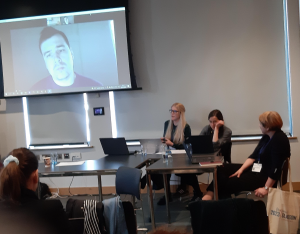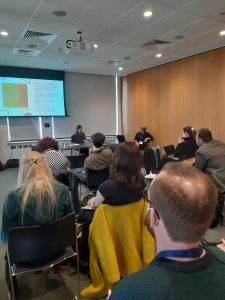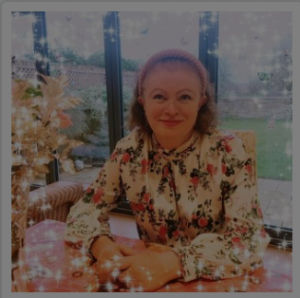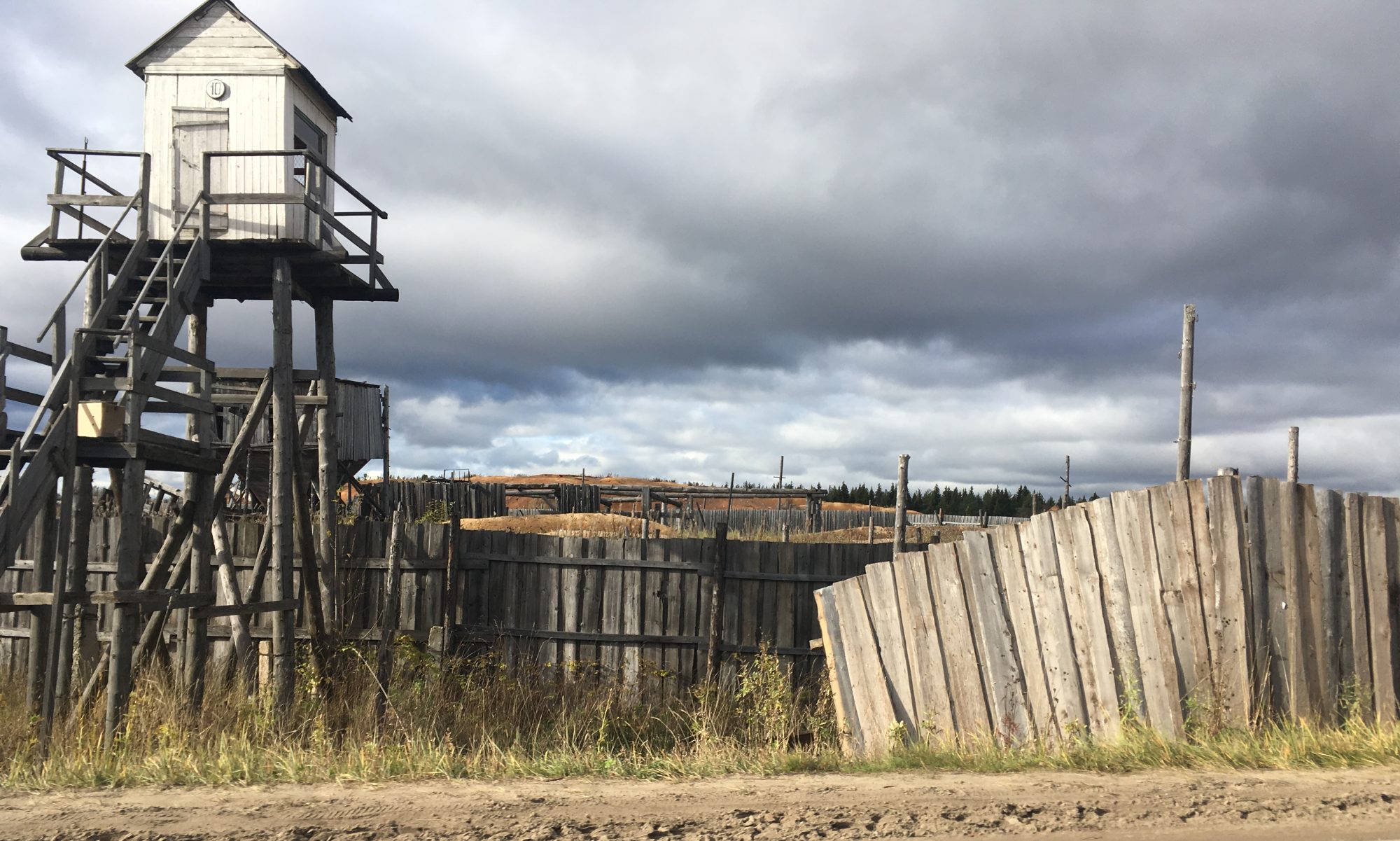25th April 2022 Dr Mikhail Nakonechnyi took part in the book launch of the edited collection “Rethinking the Gulag: Identities, Sources, Legacies” edited by Alan Barenburg and Emily Johnson, Indiana University Press. The book launch was hosted by the Harriman Institute of Columbia University. Mikhael’s paper was on the manipulation of mortality statistics in the gulag. He was joined by Gavin Slade, Sarah Young, and Dan Healy ,as well as the volume editors. The YouTube of the papers and discussion can be accessed at https://www.youtube.com/watch?v=H-Wuz_-Z11U
Report on the 2022 BASEES conference
Members of the GULAGECHOES team presented their work at the first BASEES (British Association for Slavonic and East European Studies 8-10 April, Robinson College, Cambridge) to take place in person since 2019. Originally, two panels and one roundtable had been planned to foreground our research, but their failure to secure visas for the UK meant that none of the Russian passport holders working on the project were able to travel to the conference. We decided, therefore, to merge the two panels into one which we re-titled, Negotiating ethnicity and identity in the communist and post-communist prison – from gulag to the present day. We were delighted to welcome Dr Gabriela Groza, who has conducted all the interviews for GULAGECHOES in Romanian prisons, to the panel where she joined Dr Mikhail Nakonechnyi and Dr Costanza Curro, two post-doctoral researchers on the project working respectively on the ethnic history of the gulag and the Georgian prisons system from the late Soviet period to today, and Dr Ira Jänis-Isokangas of the Finnish National Archive who is working on the letters of Finns incarcerated in the gulag. On the final day of the conference GULAGECHOES hosted a round table Gulag Legacies and Penal Reform: The Consequences of War on the Trajectories of Change in Punishment Cultures in Eurasia’. The participants consisted of two lawyers (Professor Jeffrey Kahn, expert in the Council of Europe) and Dr Sergey Golubok (now working with the ICC in The Hague on Russia’s war crimes), a criminologist (Professor Gavin Slade, from Kazakhstan), and from the Aleksanteri, the historian of Yugoslavia Dr Brendan Humphreys, anthropologist Dr Costanza Curro and geographer, and area studies specialist, Professor Judith Pallot.


Criminal cultures and criminal figures in the Soviet Union and the Post-Soviet space: Report of a GULAGECHOES online workshop organized by Dr. Costanza Curro
BY DR. COSTANZA CURRO
Dr. Costanza Curro, a Postdoctoral research fellow on the Gulag Echoes project, has been analysing criminal subcultures in Georgia’s penal system. In this blog post, Costanza reports on an online workshop she organised on 30 March 2022 as part of the GULAGECHOES project.
Escapes concealing death: the importance of regional archives for clarification of GULAG death toll
BY DR. MIKHAIL NAKONECHNYI
In this new post for the project’s research blog, Dr Mikhail Nakonechnyi reflects on regional archives and mortality statistics.
Two articles have been published in the media
Two articles have been published in the media by project PI Judith Pallot and Dr Brendan Humphreys predicting the role the Russian prison system in controlling dissent against the War in Ukraine:
“Will Russia put Ukraine dissidents into camps?” Riddle 17th March 2022
Will there be camps?
BY PROFESSOR JUDITH PALLOT AND DR. BRENDAN HUMPHREYS
In this new blog post we discuss what the future might hold for captured combatants in Ukraine and protesters against the War in Russia.
Shorter versions of this post are published in Riddle and The Guardian newspaper.
The Gulagechoes team is joined by Dr Elena Katz
The Gulagechoes team is joined by Dr Elena Katz who is helping with the coding of the interviews taken with prisoners and former prisoners over the past two years in Russia, Estonia, and Georgia. Elena is a visiting scholar of the Aleksanteri Institute for the rest of 2022. Her profile is at https://researchportal.helsinki.fi/en/persons/elena-katz

Paris conference – then meeting
On March 7-8, Dr Costanza Curro and Dr Vakhtang Kekoshvili attended a two-day meeting in Paris concerning the war in Ukraine, which had started just a couple of weeks before. The meeting took place instead of the international conference ‘The Making of the 1990s: The genesis of post-Soviet society through its material culture’, organized by Center for Russian, Caucasian and Eastern European Studies (CERCEC / EHESS – CNRS).
The originally planned event was supposed to host a number of scholars to discuss social and cultural dynamics of the Soviet 1990s through the prism of material culture. Dr Curro and Dr Kekoshvili had prepared a paper for presentation titled ‘People, time and tea: The end of the Soviet Union in the labour colony of Khoni, Georgia’. The paper explored life in the town of Khoni (Western Georgia) and the big correctional colony that it hosted in the late 1980s, through residents’ and former employees’ narratives related to the tea plantation where prisoners worked. Other topics covered by the papers to be presented included value, barter, the materiality of space, art, culture and music.
The beginning of the war in Ukraine urged organizers and participants to consider the appropriateness of holding the conference amidst such events. After a discussion on participants’ opinions and feelings – among whom there were scholars from both Ukraine and Russia – the organizers decided to cancel the conference. Instead, participants who were still able and willing to travel to Paris were invited at a meeting to discuss potential ways to deal with the conflict as academics and experts on the region. The main points of the discussion focused on ways to deal with Russian academic institutions and Russian scholars in connection with the opposition against the war (or the lack thereof), as well as on the future of research in Russia and the former Soviet region.
Online conference ”From One Crisis to the Next? Mediating Border Crises and Solidarity Activism”, 18th February 2022
Dr Larisa Kangaspuro attended the online conference ”From One Crisis to the Next? Mediating Border Crises and Solidarity Activism”. The conference provided a possibility to hear about the results of the research project “Border Crises in Two Languages: Mediatized Politics and Solidarity Activism in the Wake of the 2015 Asylum Migration”. More about the project at https://blogs.helsinki.fi/bordercrises/
Webinar “Building forward better”, 18th January 2022
Dr Larisa Kangaspuro attended the webinar “Building forward better”. The Danish Institute for Human Rights, the Universal Rights Group and the Permanent Mission of Denmark to the UN in Geneva where co-host the event following the Fourth Inter-Sessional Meeting of the Human Rights Council on Human Rights and the 2030 Agenda for Sustainable Development.
Link to the webinar programme
